I thought I would continue my last post on the subject of how we are experiencing living in a foreign country. My experience abroad, before now, has been strictly as a tourist. We stayed in hotels, ate in restaurants or from street vendors, and knew we would return home to the United States to our comfortable life and all those things we are used to. Now, of course, this is not a trip. We are not tourists; we are immigrants in a foreign land. In many ways, we are second-class citizens. We cannot vote, of course, but we cannot even express our political opinions or we are subject to deportation. The laws in Mexico, and even the enforcement of those laws are often very different from what we are used to. Here, we don't have the consumer or legal protections to which we have grown accustomed in the US. Add to that the fact that if there is a legal problem for us, we do not understand the system, and we are at the mercy of the Mexican government or law enforcement. Of course, we have had no serious problems, but you DO have to be alert and you cannot assume that people are looking our for your best interests, as much as you can in the United States. As an immigrant, you must get a legal visa which allows you to stay in the country. We had to pay $300 apiece to get this visa, called an FM3. This visa, which can be renewed every year for somewhat less expense, and allows you to travel outside of the country, allows you to live in Mexico indefinitely. To get this visa, you have to prove that you have enough income to survive here without working. If you do not have the income, you can get permission to work if you can prove that you will be working in an area which will not take a job from a Mexican citizen. If you try to work without a working permit, you are subject to immediate deportation. For this reason, the vast majority of Americans living in Mexico are retirees. We try to be good guests and appreciate the Mexican hospitality.
For many people, one of the adjustments to living in Mexico is not being able to get the same creature comforts you might have become accustomed to in the United States. For Pixie and I this is not a huge problem, but there are several items we miss. As avid tea drinkers, we have found the Mexican teas to be a mixed blessing. You can buy all sorts of herbal teas (lemon, chamomile, green, peppermint, etc.) in large packages for much less cost that the small herbal tea boxes available in the States. But for good old black tea, we prefer a British-style Tetley tea which is marketed in the US. The "te negro" here is weak and not as good. (We have given up trying to order hot tea in restaurants; the tea is lukewarm and weak.) Fortunately, we have brought a supply of tea bags with us, and our friends, Michael and Sue from Toronto who recently bought a home here, brought us a big box of Tetley when they came down a couple of weeks ago. The other product I miss is the micro-brew ales available so easily in Maine. Here, the only real choice you have is different types of Mexican lagers. I have found my favorite, a dark lager manufactured by Sol, called Indio. But, of course, it's not the same as a Gritty's bitter! Other than that, we are very content with Mexican foods, many of which are cheaper and more fresh than what we were used to. Another comfort item I do miss is comfortable furniture. Mexican furniture tends to be made of a cushion on a wooden platform, like beds, chairs, and sofas. As you might imagine, these are not as comfortable. More comfortable, American-style furniture is available, but for a high price. Pixie has been looking for one of those folding lounge chairs to use out by the pool. She saw one a few weeks ago for 400 pesos ($40) and hasn't seen one since. Go figure? I have always been a voracious newspaper reader. I could buy a USA Today for $4, or even a daily NY Times for God-knows-how-much, but I am satisfied here reading the only English language newspaper The Guadalajara Reporter, with local news, published every Saturday. I find I am reading my newspapers and some magazines online. (It is expensive to have magazines sent to a Mexican mailing address. Some Americans buy a US postal Box in Laredo Texas through Mailboxes Etc. for about $25-30 a month, but we have not found the need). Of course, as a die hard Red Sox fan, I can only see games occasionally when they broadcast the Sox on Fox on Saturdays. (We have a Canadian Satellite TV System). BUT, for $15 a year, I have subscribed to the MLB.com audio feeds of WRKO in Boston, so I sometimes listen to the games on the computer-- as I am now; Sox leading the Mariners 2-0 in the third inning. I DO miss Netflix, but we can rent videos at the Lake Chapala Society library and, of course, buy pirated films at the market for 30 pesos. The Canadian satellite has a few movie channels as well. Not Netflix, but okay. I used to belong to the Y (hi guys!) in Maine, but with the weather here, I usually walk into town every morning for my exercise. There are gyms here, but I'd prefer to walk for free. So...overall we have had to adapt to new products and services, but I am convinced we're gaining more than we are losing!
Many Americans, as I have mentioned before, take regular trips into Guadalajara to shop at WalMart, Cotsco, and Home Depot to buy the American products they are used to. They even organize bus trips to WalMart for gringos. For us, however, we seem to be able to get just about everything we need here at Lakeside, often Mexican products. Besides, I've been to these places, and you can't get Tetely Tea or Sam Adams beer, so what's the point?
One of the disturbing things about living here is to hear Americans dissing Mexico. I imagine most of these people only moved to Mexico for the climate and for the supposedly cheap prices. Other than that, they want life to be exactly as it had been for them in the US, and are disappointed when it is not. These people can be seen in local restaurants complaining that the management does not do things efficiently, making no attempt to speak Spanish, and generally acting as though they deserve special treatment because they have money. They often live in communities isolated from the Mexicans and spend an inordinately large amount of time worrying about theft and security. Needless to say, Pixie and I have been avoiding these types. Luckily, most of these people don't attend our UU fellowship.
I think one of the most striking feelings about living in a country where you obviously are different is the physical obviousness of your difference. I feel as though my light skin and lighter hair make me so obviously a gringo (and, by association, better off financially) that it feels foreign. When I wear my straw hat, it doesn't help. Gringos simply look different in straw hats; Mexicans look better in them, I think. I've never felt like an outsider before, based on the color of my skin. Although the Mexicans are warm and accepting, I can never, of course, be part of their culture. Having lots of American and Canadian friends is good in this way. I think it would be more difficult to move to a more remote area of Mexico with no other Americans. Still, I am obviously a foreigner here.
Sunday, August 5, 2007
Subscribe to:
Post Comments (Atom)
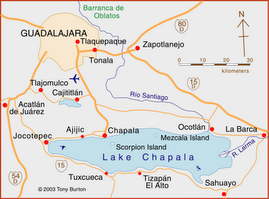












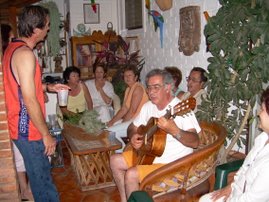






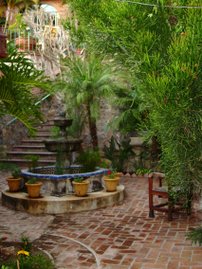
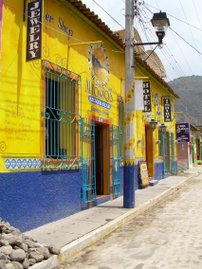
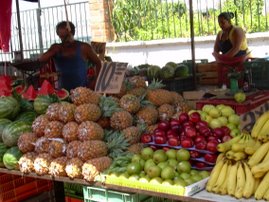


1 comment:
I just discovered your blog, from seeing your comments on Countdown to Mexico. I love your photos! It's so much fun to find people doing the same thing I did, and enjoying the same things, and having some of the same feelings. Ann
Post a Comment